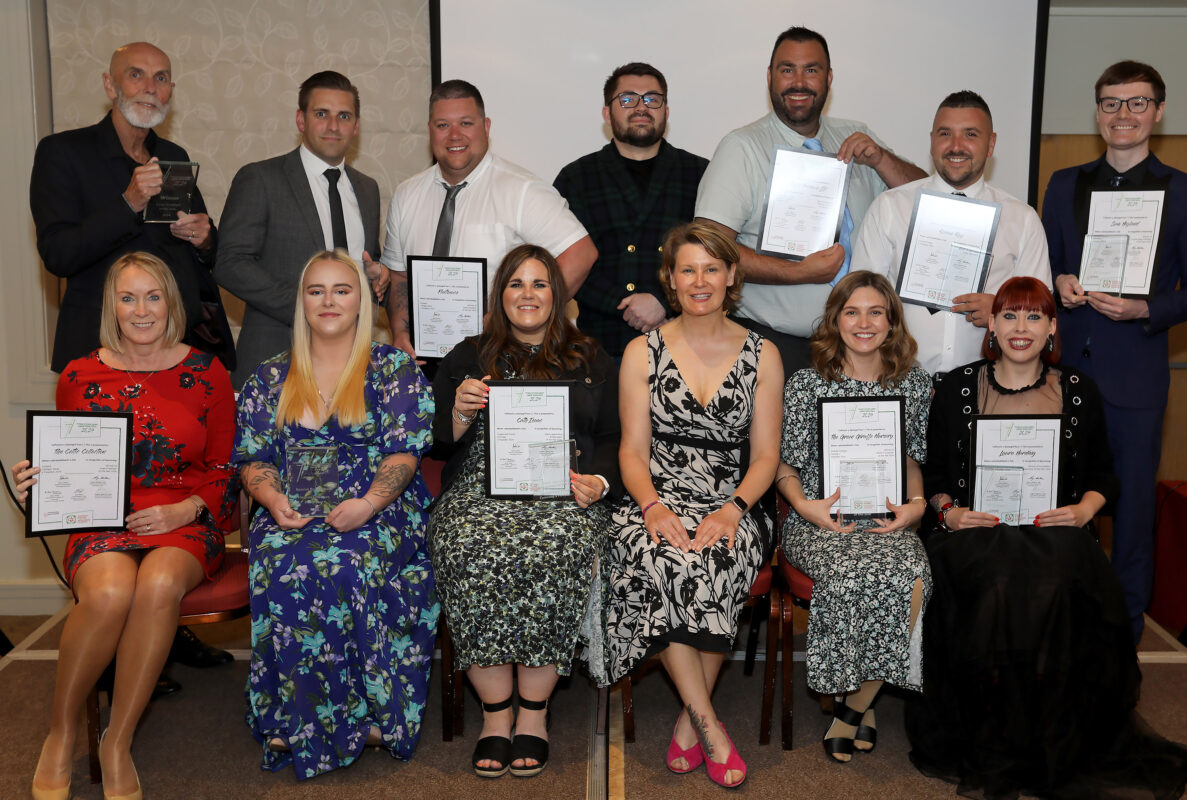Major new £14 million Creative Careers Programme to help attract more diverse talent

More than £20 million is being pumped into the UK’s thriving creative industries to help inspire and attract new talent, scale up existing businesses, boost skills and provide education.
The package of support announced by Creative Industries Minister Margot James during a visit to Dudley Technical College, will help to increase the diversity of the sector’s workforce and maintain the future pipeline of creative talent in an industry that now contributes more than £100 billion to the UK economy.
Improving the nation’s skills and boosting business opportunities is at the heart of the government’s modern Industrial Strategy, which this week celebrates its one year anniversary.
This new funding follows the publication of the Creative Industries Sector Deal earlier this year and includes:
- A new £14 million Creative Careers Programme led by industry that will see leading industry figures working with schools and colleges to raise awareness of employment opportunities in the sector, reaching more than 160,000 students by 2020. Around 2 million young people will be able to access better advice about pursuing a creative careers.
- A £4 million programme to help scale up creative enterprises in the West of England, Greater Manchester and the West Midlands – helping creative businesses to access finance and translate their ideas into investment.
- £2 million to continue the successful ‘Get it Right’ campaign with industry until 2021 – helping to educate consumers on the dangers of copyright infringement and direct them to legitimate sources of creative content online.
- £200,000 investment to upscale the Digital Schoolhouse programme being delivered by games trade body Ukie – inspiring the next generation of game creators, growing the programme to 50 schools by September 2019 and reaching an extra 7000 pupils next academic year.
- £190,000 to the UK Games Fund to build on the new Pitch Development Programme. This helps promising companies gain industry support to receive UK Games Fund grants of £25,000.
Minister for the Creative Industries, Margot James, said:
Millions of people around the world enjoy our world-class creative and cultural output every day and we want to stay as a frontrunner in these vibrant sectors.
Our creative industries are a vital part of the economy, contributing over £100 billion to the economy so it is important we maintain the pipeline of talent. This package will take the sector from strength to strength by arming the next generation of creatives with the necessary skills and giving businesses in the sector the support they need to succeed.
The Creative Careers programme will see leaders of creative businesses inspire students through talks and work experience. Businesses will also be helped to develop more accessible routes into employment in the sector, this includes creating apprenticeship standards for a number of priority roles which will be identified by industry.
The initiative will also boost the number of apprenticeships to 3000 across the creative industries by 2025 and join the hundreds of apprentices already working across the sector with employers including Pinewood Studios, Royal Opera House, V&A Museum, McCann and Google.
Tim Davie, co-chair of the Creative Industries Council said:
One year on from the Government’s announcement of its industrial strategy, it’s excellent to see delivery of the commitments in the landmark Creative Industries Sector Deal.
Our world-class creative sector is a powerhouse built on brilliant ideas. It’s vital we ensure a healthy pipeline of diverse talent to continue building on our creative success, and that we ensure a strong business environment to maximise the potential of those ideas. These commitments will provide vital support in both areas, to help our industries thrive.
The Sector Deal implementation is now well under way and I look forward to working with colleagues on the Creative Industries Council and with others across industry and Government to keep up this momentum.
Alongside skills, the government is also prioritising access to finance for creative businesses. The new scale up programme will see coaches and mentors available for businesses in the West Midlands, the West of England and Greater Manchester to overcome specific barriers to growth such as marketing, strategy planning or improving their digital footprint and specialist help will be on hand to identify appropriate sources of finance through the British Business Bank. Participating regions will also work to increase the numbers of investors interested in investing in creative businesses.
Lowell Williams, Chief Executive Officer, Dudley College of Technology / Chair of the Board of Dudley Academies Trust, said:
With the creative industry in the West Midlands generating nearly £4 billion a year to the regional economy, Dudley College of Technology is proud to be developing new talent across a range of disciplines including film and TV, fashion, games design and crafts.
We recognise the huge contribution the creative industries play, not only in economic terms but in providing a rich, vibrant culture and we are keen to train the creatives of the future. The announcement today will help support the skills agenda and also provide a boost for entrepreneurs and small businesses who have the potential for growth.
The cash injection follows the publication of new figures which reveal the value of the creative industries to the UK is up from £94.8 billion in 2016 to £101.5 billion, growing at nearly twice the rate of the economy since 2010.
The Government is committed to making sure creative businesses around the UK are supported. The creation of nine new Creative Clusters, the Government will support innovation by part-funding research partnerships between universities and industry. They will explore how digital technologies can improve the use of digital technologies to improve audience experience in the screen and performance industries, and shorten production times in the design industry.
Creative Scale Up programme
The new Creative Scale Up programme will be available for businesses in the West Midlands, the West of England and Greater Manchester to overcome specific barriers to growth such as marketing, strategy planning or improving their digital footprint and specialist help will be on hand to identify appropriate sources of finance through the British Business Bank.
West Midlands
Mayor of the West Midlands Andy Street said:
The creative and digital industries are hugely important to the West Midlands, contributing almost £4 billion to our economy.
We know we have creative strengths in the region. More than 10,000 creative businesses are based here, and we’re working to support the rapid growth in this sector, with the ambition that the digital and creative industry will employ more than 100,000 people in the West Midlands by 2030.
We want to continue the momentum we’ve built in recent months. This DCMS funding will allow us to provide dedicated support to our creative industries, match businesses with investors, and sustain the growth of this industry into 2030 and beyond.
Greater Manchester
Mayor of Greater Manchester, Andy Burnham said:
Greater Manchester is a proud city-region of innovation and our creative businesses are truly thriving. With almost 9,000 businesses, our Creative sector is the fastest growing part of the Greater Manchester economy. With more than 82,300 people and generating £4.1 billion of economic growth annually we are already home to the largest digital and creative cluster outside London.
This new programme will help us accelerate our creative businesses with ambitions to grow. We are going to work with creative businesses at scale here in our city-region to help them become investment ready and linked with the wide range of excellent business support that is on offer across Greater Manchester.
West of England
Mayor of the West of England, Tim Bowles, said:
This is terrific news; our region is recognised for its thriving creative sector and Bristol is soon to be home to one of Channel 4’s new creative hubs.
This investment will support the work we are doing on the Local Industrial Strategy, which recognises the importance of the creative industries. We are perfectly placed to drive innovation and growth here in the region, setting the direction for our economy and pushing for future growth for the UK and the world.
Caroline Norbury, MBE, Chair of the Creative Industries Council Investment Group, said:
Creative industry businesses have the potential to deliver even greater growth, but too many lack the skills to secure the investment they need to take their business to the next level. The creative scale-up programme gives us a fantastic opportunity to test how much more these companies can contribute to regional economies when they have access to the right expert advice and investor networks.
Creative Careers Programme
Of the funding for the £14 million Creative Careers Programme, £2 million is allocated for a specific programme to improve careers advice and to develop new apprenticeship standards which will be delivered jointly by ScreenSkills, Creative & Cultural Skills and the Creative Industries Federation. Government will provide £2 million funding to kick-start the programme and £12 million in-kind support has been secured from industry to-date.
Those organisations delivering the programme intend to partner with the devolved nations and industry working across them in order to ensure that it ultimately becomes UK-wide.
Quotes from partners delivering the programme:
Creative & Cultural Skills chief executive, Simon Dancey, said:
Creative & Cultural Skills is delighted to be working with ScreenSkills and the Creative Industries Federation on the development and delivery of the Creative Careers Programme. In partnership with key stakeholders and our world leading creative and cultural industries, we will together support careers advisers, teachers, parents and guardians, and thousands of young people to better understand the sector and the range of careers within it. This ambitious programme will encourage the industry to open its doors, ensuring we are accessible to all so the next generation of talent can join us and help us thrive for years to come.
Creative Industries Federation chief executive, Alan Bishop, said:
The quality and diversity of talent working in our creative industries has been central to its growth and world-leading success. We are hugely excited about our role mobilising industry’s engagement in this programme, inspiring young people to consider careers across the creative economy and helping the next generation of talent to discover the exciting opportunities that lie ahead.
Seetha Kumar, CEO of ScreenSkills, the skills body for the UK’s screen industries, said:
It is really important to attract bright young talent into creative industries such as film, TV and video games so we are really pleased to be taking the lead in transforming online careers information for hundreds of thousands of school, college and university students across the country.
Digital Schoolhouse
The Digital Schoolhouse programme has already upskilled over 5000 teachers in the new computing curriculum and improved the digital skills of over 31,000 students since 2014.
Dr Jo Twist OBE, CEO of Ukie (The Association for UK Interactive Entertainment) said:
It’s critical that we solve the creative and digital skills gap in the UK. Digital Schoolhouse is an inclusive and essential programme that gives inspiring training and accessible tools as well as confidence to educators. Crucially, it helps equip the next generation with creative computing literacy and valuable transferable skills to become part of the digital creative workforce of the future. With this valuable support, the programme can extend its reach and impact.
Shahneila Saeed, Director of Digital Schoolhouse and Head of Education at Ukie said:
Digital Schoolhouse aims to revolutionise computing in schools by bridging the gap between industry and education in order to inspire and engage the next generation. We’re thrilled that DCMS have recognised the programme’s impact by injecting vital funds to accelerate the growth of the programme. The new funding will help us to grow the programme to 50 schools across the country, providing crucial training for 3000 teachers and providing inspiring lessons and workshops for 25,000 children next year – improving their knowledge and giving them all the confidence to use the digital skills that they and the country need.
Sam, Yr 7 pupil and participant in Digital Schoolhouse workshop at St John Fisher Catholic Voluntary Academy said:
I remember Mr Ward coming to my school last year to run a computer science class using the Micro:bit devices. I’d never used anything like that before and it made me want to find out more. I asked my mum if I could buy a Micro:bit so that I could carry on at home. Having Mr Ward explain about computer science using magic made it much easier to understand. I would recommend that all primary school pupils (and their teachers!) get involved in the Digital Schoolhouse project if they can – you learn lots and it’s so much fun!
The ‘Get it Right’ campaign will be supported by leading industry organisations including Motion Picture Association, British Phonographic Industry, PRS for Music.
Ian Moss, Director of Public Affairs, British Phonographic Industry said:
Get it Right from a Genuine Site is a great example of partnership between the creative industries, Government and the Internet Service Providers. The research into the campaign has shown it really makes a difference and that a positive campaign that is relevant to fans can help change the way people think about accessing content online. With fantastic music services providing the whole history of recorded music, fans know that by choosing a legal service over illegal sites, the artists they are passionate about are rewarded for their art and creativity. The Government’s continuing commitment to the successful campaign is warmly welcomed.
Stan McCoy, President & Managing Director, Motion Picture Association EMEA said:
The Motion Picture Association thanks the UK Government for deciding to continue to support the Get It Right campaign as part of the Sector Deal. This investment will support creative sector jobs by reminding young people of the value of accessing the films and television programmes they love in a way that respects the hard work of those who made them. We look forward to the new materials that will be developed for the next stage of this important initiative to highlight opportunities in the creative industry, signpost where consumers can access legitimate forms of content of all types, and support them in making the right choice.
Published 21 June 2018
Arts Minister Michael Ellis launches £20 million fund for culture, heritage and the creative industries to benefit towns and cities across England.
Areas will be able to bid for up to £7 million for a number of projects in a certain area to help regeneration, create jobs and maximise the impact of investment. This could be for new spaces for creative businesses, bringing historic buildings back into use or redeveloping museums and art galleries.
The investment will help to grow local economies and increase access to arts, heritage and the creative industries.
The Cultural Development Fund marks a new approach for government investment in culture and creative industries. Rather than investment going to a specific venue or artform, the funding will go to geographical locations, including cities or towns in rural areas.
The fund also supports the Government’s Industrial Strategy by aiming to boost productivity in towns and cities across England and use creativity as a catalyst to make places more attractive to live, work and visit.
Michael Ellis, Minister for Arts, Heritage and Tourism, said:
Cultural investment can have a transformative impact on communities. Creativity, culture and heritage is what makes places special for local people and visitors alike. But it also helps attract inward investment, with businesses drawn to vibrant, exciting towns and cities.
This fund gives more places the chance to harness the unique power of culture to regenerate communities, create jobs and boost tourism.
The initiative comes after the success of Hull 2017. Since Hull was awarded UK City of Culture in 2013, it attracted over £3 billion of investment and created 800 new jobs.
The Cultural Development Fund also builds on the success of creative hubs launched by the Government and developed through growth and city deals, such as Bristol’s Temple Quarter. This has delivered thousands of jobs in design, media and music businesses in the West Country city.
The Government anticipates that this approach will allow smaller towns and cities to replicate the huge success of Hull and other creative hubs established across the country.
The Cultural Development Fund comes one day before the Great Exhibition of the North launches in Newcastle-Gateshead. It is part of the landmark Creative Industries Sector Deal, which will see more than £150 million jointly invested by Government and industry to help the country’s world-leading cultural and creative businesses thrive.
The Fund will be administered through Arts Council England (ACE). Bids from local areas must maximise potential economic growth and productivity, strengthen local leadership in culture and the creative industries and help to enhance creative skills.
Details of successful projects will be released in due course.
Calls for expressions of interest will run from 3 July to 15 August, with full applications sought from 9 September to 19 October.
Darren Henley, Arts Council Chief Executive said:
Our world leading Creative Industries benefit from centres of production excellence up and down the country. The Cultural Development fund will help to build on the creativity that’s at the core of our arts, heritage and tech organisations in these towns and cities. We’re looking forward to working with DCMS to spark a real difference in people’s lives through this new investment.
Sir Peter Luff, Chair of HLF, said:
Culture, and heritage in particular, are central to a strong sense of identity and place. Our research has shown that tapping into that distinctiveness can provide a significant boost not just to tourism but also to broader local economic prosperity and all the jobs that means. So we welcome this new fund, which will open up opportunities to even more communities.
Sir Peter Bazalgette, Author of the Independent Review of the Creative Industries, said:
This is one piece of a promising jigsaw envisioned in the Sector Deal: creative clusters taking root and growing, yielding both a cultural and an economic dividend.











Responses